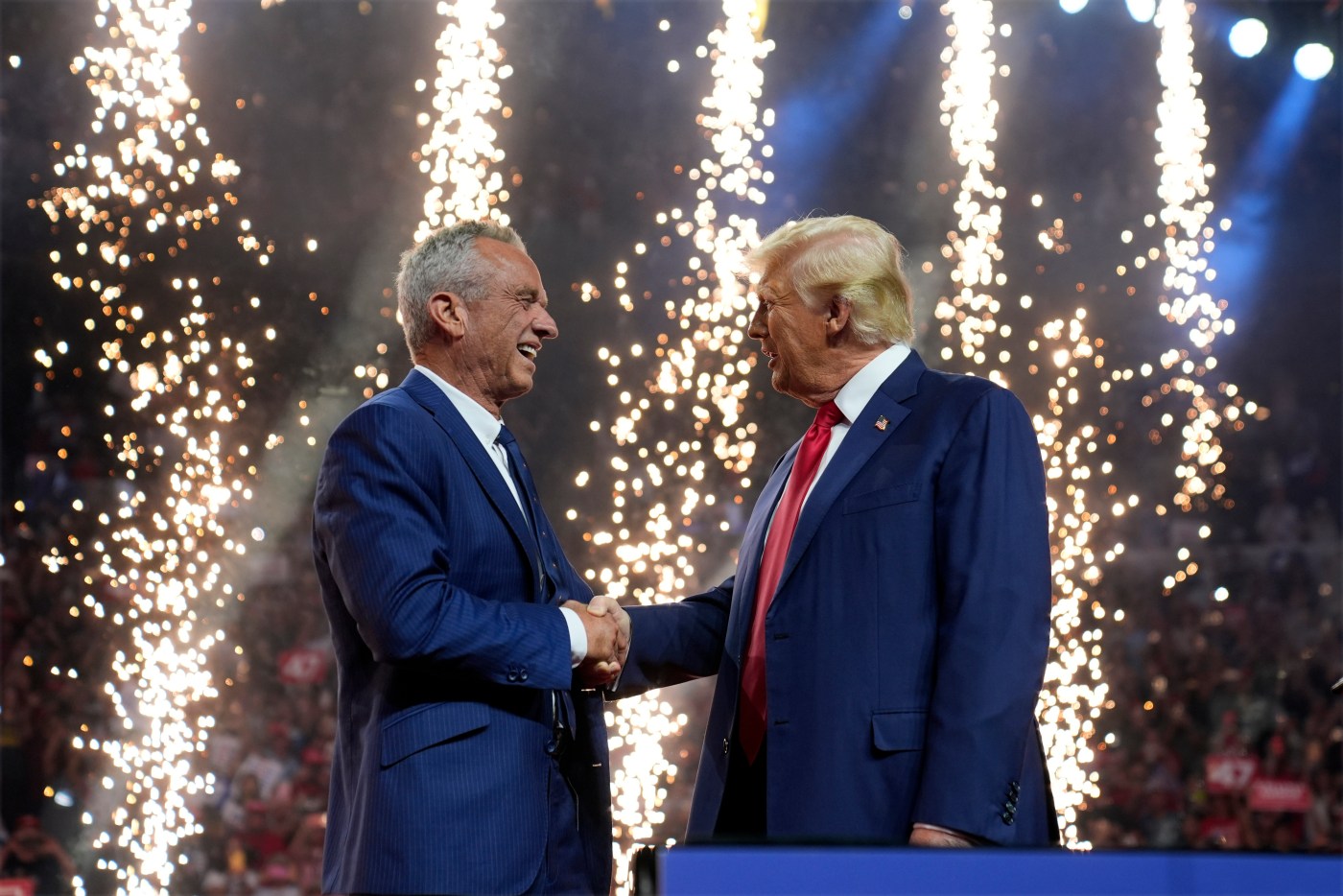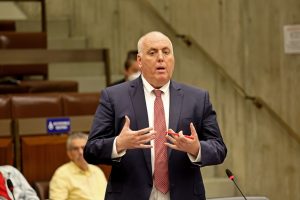
Kennedy drops out, backs Trump
PHOENIX — Robert F. Kennedy Jr. suspended his independent campaign for president Friday and endorsed Donald Trump, a late-stage shakeup of the presidential race that could give the former president a modest boost from Kennedy’s supporters.
Kennedy said his internal polls had shown that his presence in the race would hurt Trump and help Democratic nominee Kamala Harris, though recent public polls don’t provide a clear indication that he is having an outsize impact on support for either major-party candidate.
Kennedy cited free speech, the war in Ukraine and “a war on our children” as among the reasons he would try to remove his name from the ballot in battleground states.
“These are the principal causes that persuaded me to leave the Democratic Party and run as an independent, and now to throw my support to President Trump,” Kennedy said.
However, he made clear that he wasn’t formally ending his bid and said his supporters could continue to back him in the majority of states where they are unlikely to sway the outcome.
Kennedy took steps to withdraw his candidacy in at least two states late this week, Arizona and Pennsylvania, but in the battlegrounds of Michigan, Nevada and Wisconsin, election officials said it’s too late for him to take his name off the ballot even if he wants to do so.
Kennedy said his actions followed conversations with Trump over the past few weeks. He cast their alliance as “a unity party,” an arrangement that would “allow us to disagree publicly and privately and seriously.” Kennedy suggested Trump offered him a job if he returns to the White House, but neither he nor Trump offered details.
The announcement ended days of speculation and landed with heaps of confusion and contradictions from Kennedy’s aides and allies, an emblematic cap for a quixotic campaign.
Shortly before his speech in Phoenix, his campaign had said in a Pennsylvania court filing Friday that he would be endorsing Trump for president. However, a spokesperson for Kennedy said the court filing had been made in error and the lawyer who wrote it said he’d correct it.
Kennedy took the stage moments later, aired his grievances with the Democratic Party, the news media and political institutions, and extolled Trump. He spoke for nearly 20 minutes before he said explicitly that he was endorsing Trump.
Campaigning in Las Vegas, Trump said it was a “great honor” to get Kennedy’s support, but sidestepped questions about Kennedy’s policy positions and what jobs he might consider him for if he wins a second term.
“He’s just a respected person,” Trump said. “Not everybody agrees with everything he says, but that’s true with everybody.”
Hours later, Kennedy joined Trump on stage at an event in Glendale, Phoenix, where Trump’s campaign had teased he would be joined by “a special guest.”
Kennedy was met by thundering applause by the crowd after being introduced by Trump as “a man who has been an incredible champion for so many of these values that we all share.”
“We are both in this to do what’s right for the country,” he said.
A year ago, some would have thought it inconceivable that a member of arguably the most storied family in Democratic politics would work with Trump to keep a Democrat out of the White House. Even in recent months, Kennedy has accused Trump of betraying his followers, while Trump has criticized Kennedy as “the most radical left candidate in the race.”
Five of Kennedy’s family members issued a statement Friday calling his support for Trump “a sad ending to a sad story” and reiterating their support for Harris.
“Our brother Bobby’s decision to endorse Trump today is a betrayal of the values that our father and our family hold most dear,” read the statement, which his sister Kerry Kennedy posted on X.
Kennedy Jr., the son of the late Attorney General and Sen. Robert Kennedy and the nephew of President John F. Kennedy, acknowledged his decision to endorse Trump had caused tension with his immediate family. He is married to actor Cheryl Hines, who wrote on X that she deeply respects her husband’s decision to drop out but did not address the Trump endorsement.
“This decision is agonizing for me because of the difficulties it causes my wife and my children and my friends,” Kennedy said. “But I have the certainty that this is what I’m meant to do. And that certainty gives me internal peace, even in storms.”
In a statement, Harris campaign chair Jen O’Malley Dillon reached out to Kennedy’s supporters who are “tired of Donald Trump and looking for a new way forward.”
“In order to deliver for working people and those who feel left behind, we need a leader who will fight for you, not just for themselves, and bring us together, not tear us apart,” she said. “Vice President Harris wants to earn your support.”
Recent polls put Kennedy’s support in the mid-single digits, and it’s unclear if he’d get even that in a general election.
There’s some evidence that Kennedy’s staying in the race would hurt Trump more than Harris. According to a July AP-NORC poll, Republicans were significantly more likely than Democrats to have a favorable view of Kennedy. And those with a positive impression of Kennedy were significantly more likely to also have a favorable view of Trump (52%) than Harris (37%).


